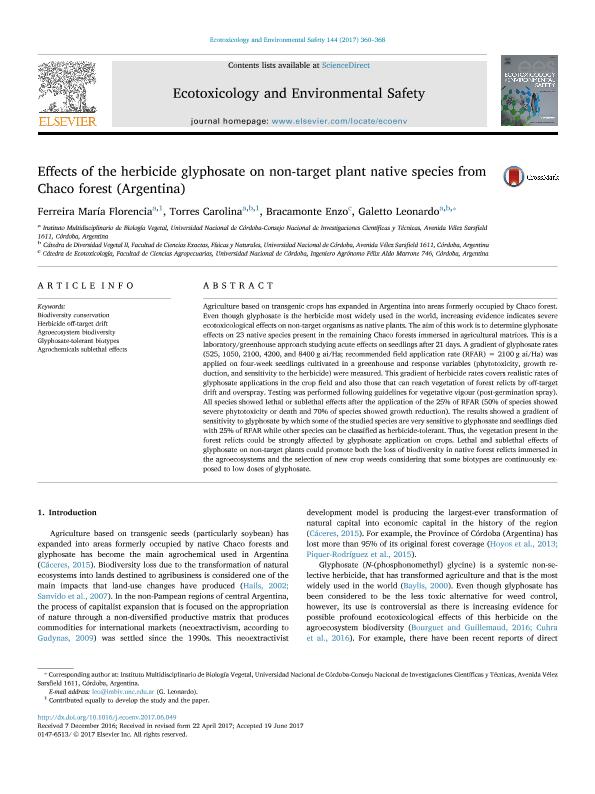Artículo
Effects of the herbicide glyphosate on non-target plant native species from Chaco forest (Argentina)
Fecha de publicación:
10/2017
Editorial:
Academic Press Inc Elsevier Science
Revista:
Ecotoxicology and Environmental Safety
ISSN:
0147-6513
Idioma:
Inglés
Tipo de recurso:
Artículo publicado
Clasificación temática:
Resumen
Agriculture based on transgenic crops has expanded in Argentina into areas formerly occupied by Chaco forest. Even though glyphosate is the herbicide most widely used in the world, increasing evidence indicates severe ecotoxicological effects on non-target organisms as native plants. The aim of this work is to determine glyphosate effects on 23 native species present in the remaining Chaco forests immersed in agricultural matrices. This is a laboratory/greenhouse approach studying acute effects on seedlings after 21 days. A gradient of glyphosate rates (525, 1050, 2100, 4200, and 8400 g ai/Ha; recommended field application rate (RFAR) = 2100 g ai/Ha) was applied on four-week seedlings cultivated in a greenhouse and response variables (phytotoxicity, growth reduction, and sensitivity to the herbicide) were measured. This gradient of herbicide rates covers realistic rates of glyphosate applications in the crop field and also those that can reach vegetation of forest relicts by off-target drift and overspray. Testing was performed following guidelines for vegetative vigour (post-germination spray). All species showed lethal or sublethal effects after the application of the 25% of RFAR (50% of species showed severe phytotoxicity or death and 70% of species showed growth reduction). The results showed a gradient of sensitivity to glyphosate by which some of the studied species are very sensitive to glyphosate and seedlings died with 25% of RFAR while other species can be classified as herbicide-tolerant. Thus, the vegetation present in the forest relicts could be strongly affected by glyphosate application on crops. Lethal and sublethal effects of glyphosate on non-target plants could promote both the loss of biodiversity in native forest relicts immersed in the agroecosystems and the selection of new crop weeds considering that some biotypes are continuously exposed to low doses of glyphosate.
Archivos asociados
Licencia
Identificadores
Colecciones
Articulos(IMBIV)
Articulos de INST.MULTIDISCIPL.DE BIOLOGIA VEGETAL (P)
Articulos de INST.MULTIDISCIPL.DE BIOLOGIA VEGETAL (P)
Citación
Ferreira, María Florencia; Torres, Carolina Cecilia; Bracamonte, Enzo; Galetto, Leonardo; Effects of the herbicide glyphosate on non-target plant native species from Chaco forest (Argentina); Academic Press Inc Elsevier Science; Ecotoxicology and Environmental Safety; 144; 10-2017; 360-368
Compartir
Altmétricas




